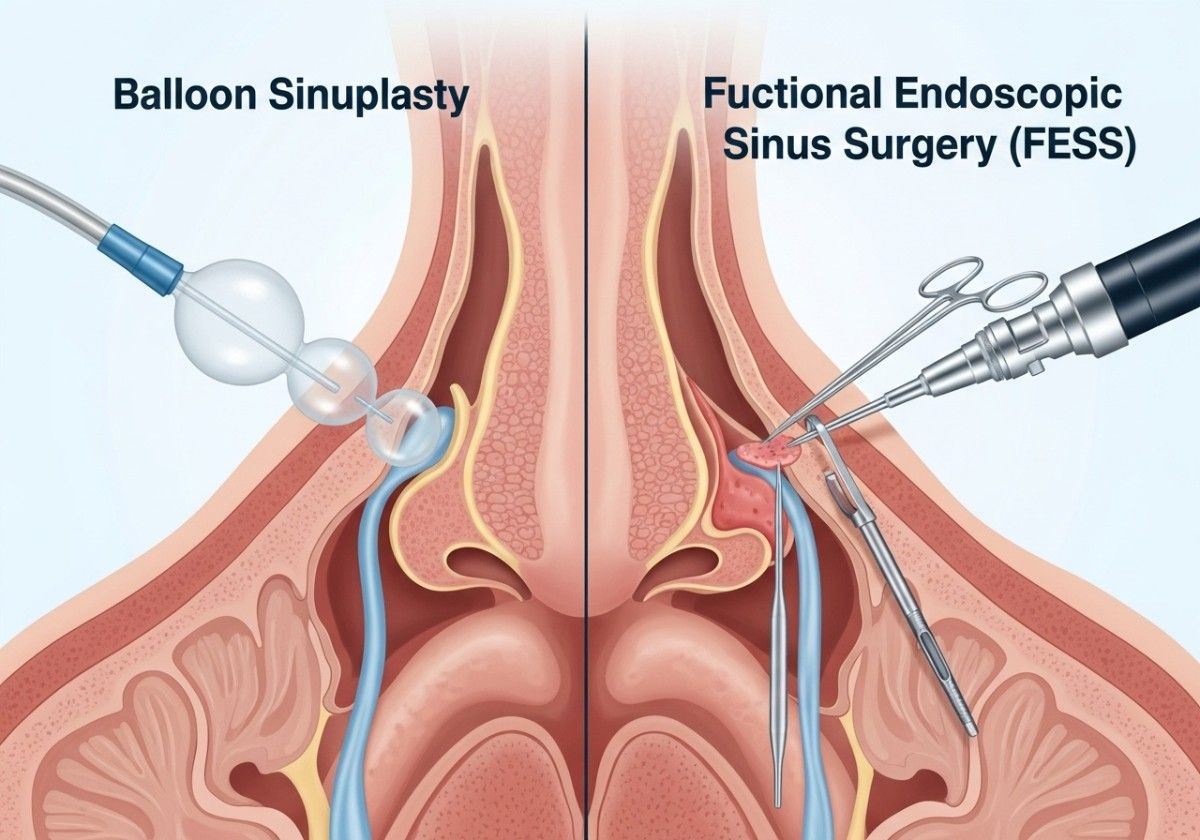Sinus problems can be more than just a nuisance—they can disrupt your daily life, cause chronic pain, and impact your overall well-being.
For many patients suffering from chronic sinusitis, two of the most recommended surgical options are Balloon Sinuplasty and Functional Endoscopic Sinus Surgery (FESS).
But which one is right for you?
At Gouda ENT, we aim to educate our patients and provide tailored treatment options. In this blog, we’ll compare Balloon Sinuplasty vs FESS, examining the benefits,
differences, recovery times, and ideal candidates for each.
By the end, you’ll have a clearer understanding of the best path forward in your sinus
treatment journey.

What Is Chronic Sinusitis?
Before diving into the treatment options, it’s important to understand the condition being treated. Chronic sinusitis is a prolonged inflammation of the sinus cavities, lasting 12 weeks or
more, despite treatment attempts. Symptoms may include:
● Nasal congestion
● Facial pain or pressure
● Headaches
● Post-nasal drip
● Reduced sense of smell or taste
● Fatigue
If medications and other non-surgical treatments don’t offer relief, ENT specialists may recommend surgical interventions, such as Balloon Sinuplasty or FESS.
What Is Balloon Sinuplasty?
Balloon Sinuplasty is a minimally invasive, FDA-approved procedure that opens blocked sinus passageways using a small, flexible balloon catheter.
How it Works:
1. A balloon is inserted into the blocked sinus opening.
2. The balloon is gently inflated to expand the sinus passage.
3. The balloon is then deflated and removed, leaving a widened, functional sinus drainage pathway.
This method does not involve cutting tissue or bone, making it a less invasive option for many patients.
Pros of Balloon Sinuplasty:
● Minimally invasive: No cutting or removal of bone/tissue
● Shorter recovery time: Most patients return to normal activities within 24–48 hours
● Performed in-office: No need for general anesthesia in many cases
● Reduced bleeding and discomfort
● Lower risk of complications
What Is Functional Endoscopic Sinus Surgery (FESS)?
FESS is a more traditional sinus surgery that uses an endoscope to view and surgically remove blockages in the sinus passages.
This may include removal of bone, polyps, or inflamed tissue to restore normal sinus drainage.
How it Works:
1. A thin endoscope is inserted into the nasal passages.
2. Blocked areas or infected tissues are surgically removed.
3. Sinus pathways are opened to improve airflow and drainage.
FESS surgery is the right choice that is usually recommended for more severe or complex cases of sinusitis that do not respond to conservative treatments or Balloon Sinuplasty.
Pros of FESS:
● Effective for complex sinus issues (e.g., nasal polyps, anatomical abnormalities)
● Long-term relief for patients with severe or recurring sinus problems
● Can address multiple sinus cavities at once
● Often used in combination with other treatments
Balloon Sinuplasty vs. FESS: Key Differences.
Let’s compare the two procedures across several important categories:
| Feature | Balloon Sinuplasty | FESS (Functional Endoscopic Sinus Surgery) |
|---|---|---|
| Invasiveness | Minimally invasive | More invasive |
| Anesthesia | Local (in most cases) | General (usually) |
| Recovery Time | 1–2 days | 1–2 weeks |
| Ideal Candidates | Mild to moderate sinusitis | Severe, chronic sinusitis or polyps |
| Tissue Removal | None | Yes |
| Risk of Bleeding | Low | Moderate |
| Procedure Location | Often in-office | Typically, a hospital/surgical center |
Which One Is Right for You?
Choosing between Balloon Sinuplasty and FESS depends on several factors, including:
1. Severity of Your Condition
- If you suffer from mild to moderate chronic sinusitis without nasal polyps, Balloon Sinuplasty may be the right choice.
- For patients with severe sinus blockages, structural issues, or nasal polyps, FESS may offer better long-term results.
2. Response to Other Treatments
If antibiotics, nasal sprays, and other conservative treatments haven’t worked, your ENT specialist may recommend either procedure based on diagnostic imaging (CT scans).
3. Lifestyle and Recovery Needs
- Balloon Sinuplasty offers a quick return to normal life, making it ideal for busy professionals or those seeking minimal downtime.
- FESS may require a longer healing period, which could be a consideration depending on your work or family obligations.
4. Your ENT Specialist’s Recommendation
A skilled ENT specialist will evaluate your condition using imaging, medical history, and endoscopic exams to recommend the most effective and safe treatment for your unique needs. At Gouda ENT, we offer personalized evaluations to help you decide between Balloon Sinuplasty and FESS.
What to Expect During Recovery
Balloon Sinuplasty Recovery:
- Minimal discomfort
- Mild congestion or drainage for a few days
- Return to work or school in 1–2 days
- Nasal irrigation recommended
FESS Recovery:
- Nasal packing or stents may be used temporarily
- Swelling, congestion, and mild pain for up to 1–2 weeks
- Regular post-op visits to monitor healing
- Avoid strenuous activities during recovery
Success Rates and Long-Term Outcomes
Both procedures are highly effective when performed by experienced ENT specialists.
- Balloon Sinuplasty has a success rate of 80–90% for appropriate candidates.
- FESS offers long-term relief in over 90% of patients with more complex sinus conditions.
Proper post-operative care and ongoing sinus management (such as saline rinses or allergy treatments) can greatly improve your outcome, no matter which procedure you choose.
Final Thoughts: Consult Gouda ENT for the Right Sinus Treatment
At Gouda ENT, we understand that sinus issues are not one-size-fits-all. That’s why we offer comprehensive sinus evaluations, advanced imaging, and both. Balloon Sinuplasty and FESS options tailored to your individual condition.
Whether you’re looking for a minimally invasive solution or need more extensive sinus surgery, our experienced ENT specialists will guide you every step of the way.


